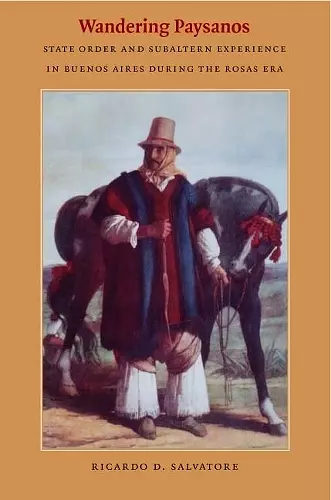Wandering Paysanos
State Order and Subaltern Experience in Buenos Aires during the Rosas Era
Format:Hardback
Publisher:Duke University Press
Published:15th Jul '03
Currently unavailable, and unfortunately no date known when it will be back

Provides a radically new interpretation of postcolonial Argentinian history, showing how marginalized groups used the resources of the market and state to avoid economic exploitation and government domination
Examining the experiences of peasants and peons, or paysanos, in the Buenos Aires province during Juan Manuel de Rosas' dictatorial regime (1829-1852), this title covers a multiplicity of subaltern voices that speak about issues of importance for the history of post-independence Argentina: markets, legal authority, politics, and public memory.A pioneering examination of the experiences of peasants and peons, or paysanos, in the Buenos Aires province during Juan Manuel de Rosas’s regime (1829–1852), Wandering Paysanos is one of the first studies to consider Argentina’s history from a subalternist perspective. The distinguished Argentine historian Ricardo D. Salvatore situates the paysanos as mobile job seekers within an expanding, competitive economy as he highlights the points of contention between the peasants and the state: questions of military service, patriotism, crime, and punishment. He argues that only through a reconstruction of the different subjectivities of paysanos—as workers, citizens, soldiers, and family members—can a new understanding of postindependence Argentina be achieved.
Drawing extensively on judicial and military records, Salvatore reveals the state’s files on individual prisoners and recruits to be surprisingly full of personal stories directly solicited from paysanos. While consistently attentive to the fragmented and mediated nature of these archival sources, he chronicles how peons and peasants spoke to power figures—judges, police officers, and military chiefs—about issues central to their lives and to the emerging nation. They described their families and their wanderings across the countryside in search of salaried work, memories and impressions of the civil wars, and involvement with the Federalist armies. Their lamentations about unpaid labor, disrespectful government officials, the meaning of poverty, and the dignity of work provide vital insights into the contested nature of the formation of the Argentine Confederation. Wandering Paysanos discloses a complex world until now obscured—that of rural Argentine subalterns confronting the state.
“In the best tradition of subaltern studies, Ricardo Salvatore goes to the military records, court cases, and police files that most reveal the testimony of the popular classes. His book represents the most complete and nuanced analysis of the lives of peons, migrants, itinerants, and common soldiers—including their dress, family relationships, interaction with the Rosista state, and demands for liberty in the job market. Wandering Paysanos is both theoretically sophisticated and richly documented.”—Jonathan C. Brown, University of Texas
"Meticulously researched in official correspondence, military records, judicial archives, political poetry, and other popular narratives, Wandering Paysanos contributes importantly to interdisciplinary discussions of modern state formation and rural political and social consciousness. Few students of the Latin American past can match Salvatore in combining skillful analysis of political, social, and economic relations with an ability to deconstruct and interpret texts. This volume redeems the promise of Latin American subaltern studies."—Gilbert M. Joseph, Yale University
"Wandering Paysanos is an outstanding contribution to both the history of the first half of the nineteenth-century in Argentina and the recuperation of subaltern voices in Latin American studies."
-- José Antonio Sánchez Román * Hispanic American Historical Review *
"Impressive. . . . Salvatore's analysis is rich and nuanced." -- Ruth Stanley * Crime, History and Societies *
"Masterful. . . . The book contains much of interest to scholars, graduate students, and advanced undergraduates specializing in peasant studies, comparative development in Latin America, Latin American history, and penal and military history. . . . Vivid and absorbing. . . . This is social history at its best." -- Lisa Kowalchuk * American Journal of Sociology *
"This book represents an enormous contribution . . . to the political and social history of rural populations of nineteenth-century Latin America." -- Jose C. Moya * The Americas *
ISBN: 9780822330868
Dimensions: unknown
Weight: unknown
544 pages